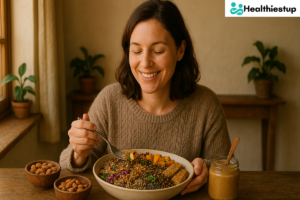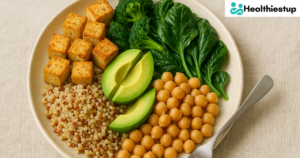Introduction
Protein for Breastfeeding Mommy: Breastfeeding is a magical time filled with bonding, nourishment, and a rollercoaster of emotions and energy needs! For vegetarian or plant-based moms, one big question often comes up: how to get enough protein while breastfeeding? Don’t worry, mama! We’ve got the scoop on the best veg. protein for breastfeeding mommy that’ll help support milk production, postpartum recovery, and your overall energy.
Let’s walk through everything you need to know to keep both you and your baby thriving with wholesome, plant-based goodness.
Why Protein Is Crucial for Breastfeeding Mommy
Protein for Breastfeeding Mommy: Protein is the building block of life. For breastfeeding mommy, it’s even more important. Here’s why:
-
Milk Production: Protein is essential to help your body produce quality breast milk.
-
Postpartum Recovery: Your body needs protein to heal after childbirth and regain strength.
-
Energy Levels: Nursing takes a lot of energy—protein helps stabilize blood sugar and maintain energy.
-
Baby’s Growth: The protein in your breast milk helps your baby develop healthy muscles, organs, and tissues.
According to the CDC, breastfeeding women need an extra 25 grams of protein per day, totaling around 65–70 grams daily.
Top Vegetarian Source of Protein for Breastfeeding Mommy
Protein for Breastfeeding Mommy: Let’s break down the best plant-based protein options to power up your diet.

1. Lentils and Legumes
Protein Content: ~18g per cup (cooked)
Lentils, chickpeas, black beans, and kidney beans are powerhouses of protein. They’re also high in iron, fiber, and essential minerals, which help prevent postpartum anemia and support digestion.
2. Tofu and Tempeh
Protein Content: Tofu: ~10g per half cup | Tempeh: ~15g per half cup
Made from soybeans, tofu and tempeh are complete proteins containing all nine essential amino acids. They’re also rich in calcium and phytoestrogens that may boost milk production.
3. Quinoa
Protein Content: ~8g per cup (cooked)
This gluten-free grain is a complete protein, rich in iron and magnesium—nutrients that support muscle repair and energy production.
4. Nuts and Nut Butters
Protein Content: Almonds: ~6g per ounce | Peanut Butter: ~7g per 2 tbsp
Healthy fats + protein? Yes, please! Nuts help with milk supply and keep you full longer. They’re also packed with omega-3s that benefit your baby’s brain development.
5. Chia Seeds and Flaxseeds
Protein Content: ~5g per 2 tbsp
Tiny but mighty! These seeds are rich in protein, omega-3s, and fiber. Add them to smoothies, oatmeal, or yogurts.
6. Greek Yogurt (if lacto-vegetarian)
Protein Content: ~20g per cup
Greek yogurt supports gut health, supplies calcium, and adds a creamy protein boost to your snacks or breakfasts.
7. Edamame
Protein Content: ~17g per cup (cooked)
These green soybeans are easy to prep and delicious as a snack or salad topper.
8. Protein Powders (Plant-Based)
Choose clean, plant-based protein powders made from peas, rice, or hemp. Look for those labeled “breastfeeding safe” without artificial sweeteners or additives.
How to Include Protein in Every Meal
Protein for Breastfeeding Mommy: Here’s how to sneak protein into each meal:
| Meal | Protein-Rich Options |
|---|---|
| Breakfast | Quinoa porridge, chia pudding, nut butter toast |
| Lunch | Lentil soup, quinoa salad with tofu |
| Snack | Trail mix, Greek yogurt, protein smoothie |
| Dinner | Tempeh stir-fry, chickpea curry with rice |
| Dessert | Protein bars, nutty energy balls |
Does Plant-Based Protein Affect Breast Milk Quality?
Protein for Breastfeeding Mommy: Absolutely not. Plant proteins are just as effective for milk production as animal-based ones. The key is variety and balance. Combine different protein sources to get all the amino acids your body needs.
Also, include iron, B12, calcium, and omega-3s in your diet. Consider a plant-based prenatal or postnatal supplement if needed.

Signs You Need More Protein for Breastfeeding Mommy
Protein for Breastfeeding Mommy: Watch for these clues:
-
Feeling unusually tired or sluggish
-
Hair thinning or brittle nails
-
Trouble healing postpartum wounds
-
Low milk supply
-
Muscle weakness
If you notice any of these, it’s time to amp up your plant protein intake!
Best Protein-Rich Snacks for Breastfeeding Mommy
Protein for Breastfeeding Mommy: Keep these snacks on hand for quick, nutritious bites:
-
Roasted chickpeas
-
Hummus and veggie sticks
-
Oatmeal energy balls
-
Protein smoothie with almond butter and chia seeds
-
Overnight oats with flaxseeds
-
Trail mix with pumpkin seeds and cranberries
Smoothie Recipe for Breastfeeding Protein Boost
Green Power Protein Smoothie
-
1 cup unsweetened almond milk
-
1 frozen banana
-
2 tbsp peanut butter
-
1 tbsp chia seeds
-
1 scoop plant-based protein powder
-
Handful of spinach
-
Ice cubes
Blend and enjoy! Full of protein, fiber, and healthy fats to keep you full and energized.
Grocery List for a Week of Plant-Based Protein
Here’s a quick shopping guide:
-
Lentils (red, green)
-
Chickpeas (canned or dry)
-
Quinoa
-
Tofu & Tempeh
-
Almonds & Walnuts
-
Peanut Butter
-
Chia Seeds & Flaxseeds
-
Greek Yogurt (optional)
-
Frozen Edamame
-
Spinach, Kale, Broccoli
-
Unsweetened Plant Milk
-
Whole Grain Bread
-
Plant-Based Protein Powder
Pro Tips to Maximize Protein Absorption
-
Pair with Vitamin C: Helps with iron absorption (e.g., lentils + lemon juice).
-
Avoid Tea/Coffee Right After Meals: Tannins can block iron absorption.
-
Cook Wisely: Soaking and cooking beans reduce anti-nutrients and aid digestion.
-
Keep Hydrated: Helps your body digest and utilize protein efficiently.
Conclusion
Protein for Breastfeeding Mommy: Stay Strong, Mama! Eating a balanced, protein-rich diet while breastfeeding helps you recover faster, feel more energized, and produce high-quality milk. With so many delicious, plant-based options available, meeting your protein goals doesn’t have to be a chore. Mix it up, keep it colorful, and trust your body—it’s doing amazing things!
FAQs: Protein for Breastfeeding Mommy
Q1. Can I get enough protein as a vegetarian while breastfeeding?
Yes! With a variety of legumes, grains, seeds, and plant-based options, you can meet your daily protein needs easily.
Q2. What are signs I’m not eating enough protein while breastfeeding?
Fatigue, poor milk supply, muscle weakness, and slow postpartum recovery may indicate a protein deficiency.
Q3. Is soy safe during breastfeeding?
Absolutely. Unless you or your baby have a soy allergy, tofu, tempeh, and edamame are excellent protein-rich foods.
Q4. Can protein powders help if I’m not eating enough?
Yes, just choose clean, plant-based powders made for breastfeeding mommy without artificial ingredients.
Q5. How much protein do I really need daily?
Roughly 65–70 grams daily during breastfeeding, or about 25 grams more than pre-pregnancy levels.
Q6. Are there any risks with eating too much protein?
Not usually from food sources. Just balance it with carbs, fats, and hydration to support digestion and milk production.



